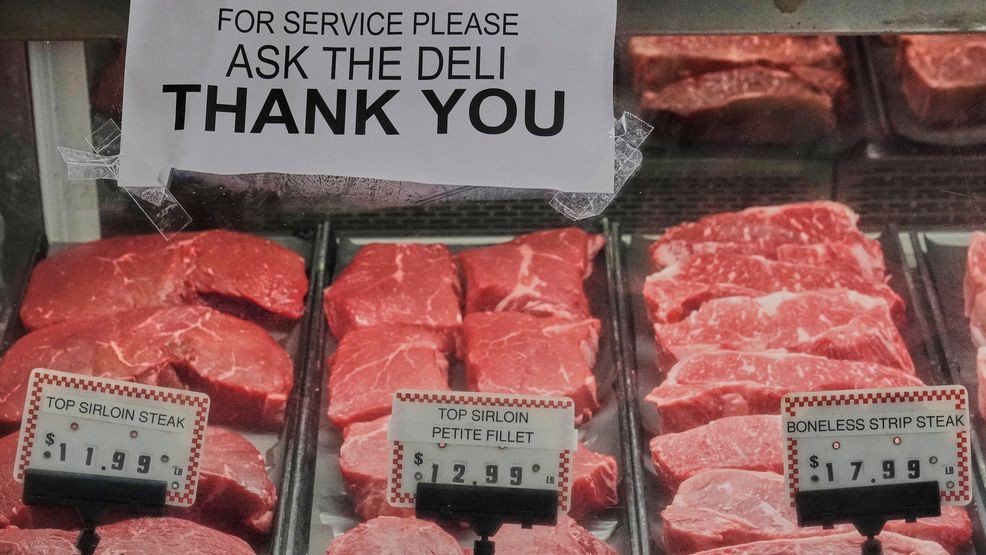

President Donald Trump on Friday granted exemptions for important agricultural imports such as coffee, cocoa, bananas, and specific beef products from increased tariff rates.
This decision comes as Trump encounters political backlash over the soaring prices at U.S. grocery stores. Certain distributors of beef, coffee, chocolate, and other staple food items have increased prices following the introduction of Trump’s tariffs this year, further straining household budgets amid long-standing high inflation.
Friday’s exemption by Trump also includes various fruits such as tomatoes, avocados, coconuts, oranges, and pineapples. The reductions in tariffs extend to coffee, as well as black and green tea, and spices including cinnamon and nutmeg.
This action represents a shift for Trump, who has maintained that tariffs are essential for safeguarding American businesses and workers. He has argued that U.S. consumers will ultimately not bear the brunt of increased duties.
The exemptions were announced just a day after Trump finalized trade framework agreements with four Latin American nations – with tariffs of 10% on most products from Argentina, Guatemala, and El Salvador, and 15% from Ecuador. It also abolishes duties on items not sufficiently cultivated or produced in the U.S., such as bananas and coffee.
Soaring food prices have burdened American families for several years. Consumer Price Index figures indicate that grocery prices rose by approximately 2.7% from the previous year in September. (Recent data was postponed due to the government shutdown).
The exemption of tariffs aims to alleviate some of the grocery price hikes, although experts warn that other elements such as global supply shortages also impact prices, particularly for coffee and beef.
Over the past year, the U.S. enforced high duties on major exporters including Brazil, Australia, New Zealand, and Uruguay. Brazil – recognized as the world’s second-largest beef producer – has been subjected to effective tariff rates surpassing 75%, which has led to a decline in U.S. imports just as the nation’s cattle herd reaches a near 75-year low.
Ranchers are grappling with efforts to rebuild their herds amid drought conditions, surging feed prices, and tariffs on fertilizer, steel, and aluminum that have inflated equipment and repair costs.
The supply constraints have driven a surge in grocery prices: uncooked beef products saw a rise of 12% to 18% year over year in September, according to the latest consumer price index report from the Bureau of Labor Statistics.
Producers informed CNBC earlier this month that policy fluctuations, including shifts in tariff rates and the recent increase of Argentina’s beef quota, have dampened long-term investment, perpetuating tight supplies and fragile confidence.
Ground roast coffee prices in the U.S. hit $8.41 per pound in July, a historic peak and a 33% rise from the previous year, according to Bureau of Labor Statistics data.
Trump’s 50% tariff on Brazilian coffee – which constitutes about a third of U.S. imports – has escalated costs throughout the roasting and retail supply chains. Vietnam, Colombia, and other significant suppliers have also been affected by the administration’s food tariffs.
Roasters and cafés assert they have no alternatives to these duties since the U.S. does not cultivate any of the beans it uses, placing importers at the mercy of rising costs no matter the source. The September CPI report revealed that coffee prices surged by almost 21% in August compared to the previous year. It marked the largest increase since the 1990s.
Retailers have cautioned that the effects could have been broader had the tariffs remained in place. The Tax Foundation estimated in August that 74% of U.S. food imports were subjected to tariffs, already impacting tea, spices, and other goods that, like coffee, lack a domestic supply chain.
Many of these products with minimal or no U.S. production were included in the list of items Trump exempted from higher tariffs on Friday.
Global coffee prices are currently hovering around a 50-year high reached in February.
Cocoa
Cocoa has encountered similar pricing challenges.
Even after a significant selloff this autumn, futures prices remain over double pre-pandemic levels, currently costing about $5,300 today, following tariffs and three years of weather-related crop failures in Ivory Coast and Ghana.
In October, Hershey executives indicated they expected $160 million to $170 million in tariff costs this year, coupled with record-high bean prices that have driven retail chocolate prices up nearly 30% from the previous year as Halloween approached, according to research firm Circana.

